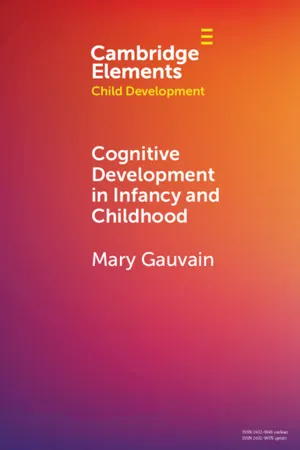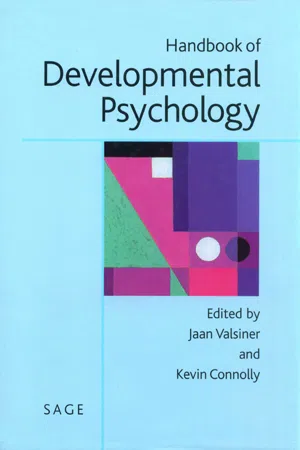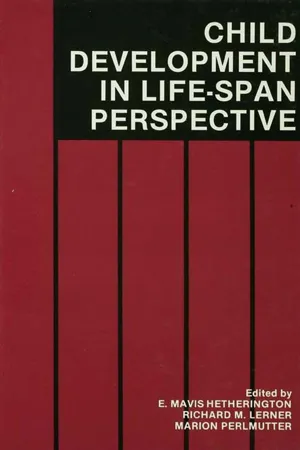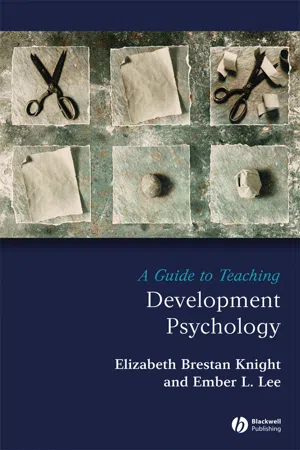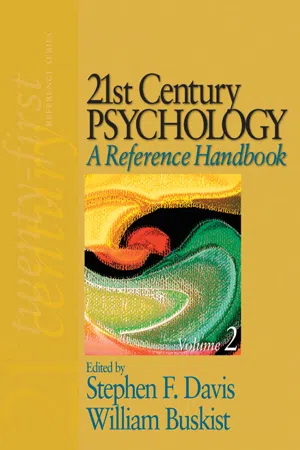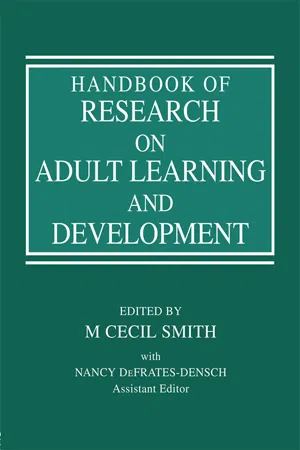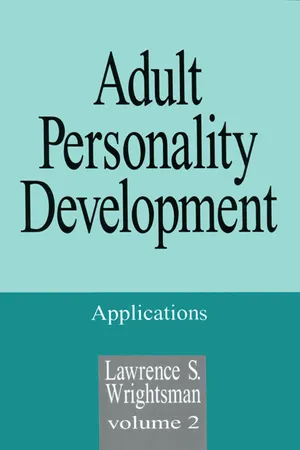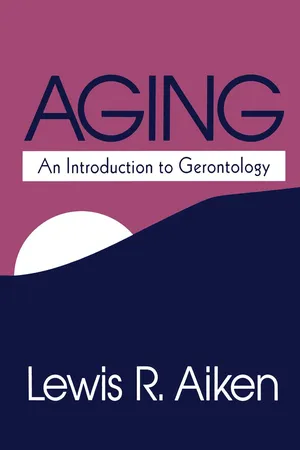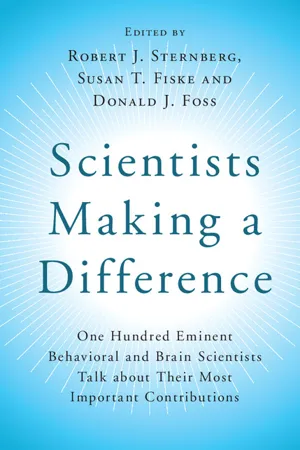Psychology
Cognitive Development in Adulthood
Cognitive development in adulthood refers to the changes and growth in mental processes and abilities that occur as individuals age. This includes aspects such as problem-solving, decision-making, and memory. While some cognitive abilities may decline with age, others, such as wisdom and expertise, may continue to develop. Factors such as lifestyle, education, and social engagement can influence cognitive development in adulthood.
Written by Perlego with AI-assistance
Related key terms
1 of 5
12 Key excerpts on "Cognitive Development in Adulthood"
- No longer available |Learn more
- Philip Banyard, Christine Norman, Gayle Dillon, Belinda Winder, Philip Banyard, Christine Norman, Gayle Dillon, Belinda Winder(Authors)
- 2019(Publication Date)
- SAGE Publications Ltd(Publisher)
Cognitive well-being By the start of adulthood, most individuals have developed the cognitive skills that enable them to function in society. Maturity used to be seen as a marker of the end of adolescence, but we now know that people continue to develop both physically and mentally during adulthood. Although there can be big differences in people’s abilities (e.g. your friend may be better at remembering telephone numbers while you may be better at solving problems), most develop sufficient cognitive skills to get on with their daily lives. Does this mean that cognitive development simply comes to a halt on your eighteenth birthday? Cognitive researchers think definitely not. 496 DEVELOPMENTAL PSYCHOLOGY Riegel (1976) was one of the first to propose that experiences in adulthood expose us to a new level of cognitive challenges. With increased and more varied experiences, he stated, we start to learn that the world is often a contradictory and complicated place, and sometimes it does not make sense at all! Riegel argued that achieving the intellectual ability to deal with the contradictions that confront us entails developing a more advanced way of thinking termed ‘postformal thought’. Further research into postformal reasoning found that it is characterised by the ability to take into account differing viewpoints and contextual factors. Some theorists suggest that the characteristics associated with post- formal thought simply signify the development of integrative thinking within the formal stage (e.g. Kallio, 1995; Kallio & Helkama, 1991; Kramer, 1983), but no one doubts that cognitive development continues well after the individual leaves adolescence. More recent investigations into intellectual development in adulthood have been based more around the use of psychometric tests, with researchers seeking to ascertain whether there are age-related differences in measures of intelligence throughout adulthood. - Mary Gauvain(Author)
- 2022(Publication Date)
- Cambridge University Press(Publisher)
Studies of what develops focus on changes over time in mental capacities, knowledge, and skills. This Element describes the develop- ment in a wide range of aspects of cognition: attention, language, social cogni- tion, memory, metacognition and executive function, and problem-solving and reasoning. Cognitive development is simultaneously universal and context-specific. Some cognitive changes are common to all human beings, and others vary within individuals and between groups or populations. This arrangement reflects a hallmark of human cognition – flexibility. People use their mental capabilities to deal with the problems of daily life. Culture, the natural eco- logical setting or habitat of human beings, plays a significant role by providing support and direction for cognitive development. 2 Cognitive Development: Coming to Understand and Act in the World The world is a complicated place. It is full of objects, some natural and others human-made. It is also full of people and activities. How do children make 1 Cognitive Development in Infancy and Childhood sense of it all, learn what the world has to offer, and then use this knowledge in productive and satisfying ways? This task, which is already huge, is further complicated because, while children are learning about the world, they are developing in many other ways. They are maturing physically, establishing relationships with the people in their lives, and acquiring and honing a large number of skills that allow them to participate in the activities around them. Cognitive development is one part of the biological, psychological, and social changes that make up human development. These changes are coordin- ated with and inform one another over time. They also have contingency relations; changes in one area may enable or facilitate changes in another area. For instance, what children perceive and the objects they explore contrib- ute to cognitive development.- eBook - PDF
- Jaan Valsiner, Kevin J Connolly, Jaan Valsiner, Kevin J Connolly(Authors)
- 2002(Publication Date)
- SAGE Publications Ltd(Publisher)
21 Adult Cognitive Development: Dynamics in the Developmental Web KURT FISCHER, ZHENG YAN and JEFFREY STEWART Adulthood normally spans more than 60 years, starting from about age 20, and the cognitive changes during those years are vast. Accumulated evidence indicates that Cognitive Development in Adulthood is rich, complex, and dynamic, perhaps even more so than in infancy and childhood, with many factors acting together in various contexts to produce systematic, dynamic variation. For instance, it can be observed that adults frequently show regression performances and move down to lower levels of cognitive skill and then construct higher levels, instead of always following a simple forward progression. This kind of backward transition phenomenon in adult cognitive processes shows an interesting and important cognitive advancement, one that may seem frustrating and counter-intuitive to many intelligent adults. Backward transition is just the tip of the large ice-berg of complex Cognitive Development in Adulthood. In this chapter, we reframe adult cognitive develop-ment dynamically, resynthesizing research findings to reveal the complex dynamics behind the variability in adult cognitive development, and reexamine the limitations of traditional cognitive analyses (Fischer, 1980b; Fischer & Bidell, 1998; Valsiner, 1991; van Geert, 1994). A constructed web (like that built in nature by a spider) serves as the meta-metaphor for development, and from the web we elaborate three important types of dynamic patterns in adult cognitive development: dynamic ranges, dynamic strands and networks, and dynamic constructions. With these concepts, we begin to capture the richness and com-plexity of adult cognitive development and to offer a new story about what, how, and why adult cognitive development takes place over time. - eBook - ePub
- E. Mavis Hetherington, Richard M. Lerner, Marion Perlmutter(Authors)
- 2013(Publication Date)
- Psychology Press(Publisher)
9 COGNITIVE DEVELOPMENT IN LIFE-SPAN PERSPECTIVE: From Description of Differences to Explanation of Changes Marion Perlmutter University of Michigan ABSTRACT The purposes of this chapter are to articulate an agenda for cognitive developmentalists and to consider how well it is being met. It is suggested that cognitive developmentalists should be addressing two major questions: What are the ways that cognition changes with age? and What are the causes of this change? An overview of alternative approaches to the study of cognitive development is presented, and an integrative, three tier model, framed within a multidisciplinary perspective is forwarded. It is argued that research on cognitive development has made considerable progress with respect to describing the ways that cognition changes with age but has failed in explaining the causes of age change. Some conceptual reasons for the paucity of such information are discussed, and recommendations are made for the reconceptualization of research design, adoption of a life span perspective, and reassessment of assumptions. INTRODUCTION Cognition is a psychological construct that refers to all of mental life. It includes perception, memory, intelligence, reasoning, judgment, and decision making. It permits humans to represent and to think about the world, to conceptualize experience, to fantasize beyond experience, to maintain a sense of self, and to communicate with others. It expands individual competence and allows us to solve and to circumvent problems. Memory, for example, keeps track of events that have occurred in different times and distant places. Intellectual skills enable us to reflect upon experiences and to attach meaning and significance to them. As individuals, this ability gives us the power to anticipate and plan for the future, to develop strategies, to hypothesize alternatives, and to evaluate consequences - eBook - PDF
- Elizabeth Brestan Knight, Ember L. Lee(Authors)
- 2009(Publication Date)
- Wiley-Blackwell(Publisher)
Young Adult Development 167 Chapter 8 Young Adult Development Most of your undergraduate students will be able to relate well to young adult development. Concerns related to academic perform-ance, physical conditioning, dating, mate selection, and career selec-tion are topics that many undergraduate students encounter daily. In our coverage of this section, we acknowledge that our students are the “experts” because they currently experience the young adult stage of development. We see our task for this section as presenting research that relates to adult cognition, factors related to college enrollment, mate selection, and career selection. Early Adulthood Physical and Cognitive Development There are several theories that highlight current perspectives on young adult cognition. Unlike previous sections of the course that deal with the cognitive functioning of adorable newborns or charming tod-dlers, we find that adult cognition can be a tough sell for an engag-ing lecture. In our experience, including examples that students may encounter themselves helps to increase the interest level in early adult cognitive development. Before we lecture on the theories of adult cognition, we distribute a handout listing the theories and 168 Young Adult Development their corresponding stages in detail. The theories that we believe are important for a sound understanding of young adult cognition include Piaget’s formal operations stage (Piaget, 1972), Labouvie-Vief’s theory of adult cognitive development (Labouvie-Vief, 1992), Perry’s theory of adult cognitive development (1970), and Schaie’s theory of adult cognitive development (Schaie, 1994). We have found that it often takes the majority of a class period to outline these theories and provide examples. Although we tend to focus on cogni-tive development in the young adult period, a discussion of physical conditioning and the range of physical abilities of individuals in the young adult period could work just as well. - Stephen F. Davis, William Buskist, Stephen F. Davis, William F. Buskist(Authors)
- 2007(Publication Date)
- SAGE Publications, Inc(Publisher)
Finally, some theorists have proposed different cogni-tive models of life span development that have multiple stages in adulthood (Schaie, 1986). This echoes the work done by Piaget but extends cognitive modeling to an entirely different population. In some of these cognitive models, the adult stages include achieving period, social responsibility period, executive period, reorganization period, reintegration period, and legacy period. Expertise Development Although much debate has occurred regarding how mental processes change as one gets older, one area of cognition, the development of expertise, appears to be firmly rooted in adult development. As people age, they gain more experience in making decisions. Research indi-cates that the difference between experts and novices is not due to the amount of information that an expert possesses. Rather, the difference occurs in the use of the information available (Shanteau, 199). Specifically, experts use far fewer cues when making a judgment than novices do. This ability to narrow down the information needed to make a judgment is achieved only through experience. Additionally, those who show expertise in an area are capable of making judgments far more quickly than their novice counterparts. Again, this is a skill that is a result of experience. Simply, when novices are faced with a judg-ment to make, they evaluate all available cues, including those that are irrelevant to the given situation; this takes time. Someone with expertise evaluates only those cues they deem relevant through years of experience; this takes far less time. However, although people may gain experience in a number of different domains throughout their lives, rarely do they develop expertise in all of these areas; hence, the development of expertise is highly task and domain specific (Weiss & Shanteau, 006).- eBook - PDF
Middle Adulthood
A Lifespan Perspective
- Sherry L. Willis, Mike Martin, Sherry L. Willis, Mike Martin(Authors)
- 2005(Publication Date)
- SAGE Publications, Inc(Publisher)
Six Cognitive Development in Midlife Mike Martin and Daniel Zimprich T he group of middle-aged adults between the ages of roughly 40 and 65 years gains growing interest from the public and scientists alike because it currently represents one of the largest age groups in Europe and the United States. A better understanding of midlife cognitive development and related factors might become increasingly important as these cohorts reach old age, and cognitive aging affects an increasingly large proportion of the overall population. In this chapter, we review selected literature on cognitive development in middle adulthood. Our focus is on cognitive development because cognition is one of the key competencies needed in young and old age to meet the challenges of education, job demands, and everyday life (M. M. Baltes & Lang, 1997; Martin & Mroczek, in press). 179 Parts of the preparation of this chapter were supported by grant SNF 101411–103525/1 to M. Martin, D. Zimprich, and M. Kliegel. Studies of cognitive development in midlife can be characterized by two main approaches. On one hand, the decline of cognitive resources is a main concern for persons from middle age onward (Lawton et al., 1999). Thus, studies on midlife cognition have focused on the question of whether groups at risk for decline in early old age could be identified. The timely identification of at-risk individuals would permit preventive mea-sures targeted at early stages of decline (see Schaie, 2000). One could spec-ulate that middle age would be an ideal time for preventive measures because the performance around a lifetime peak level increases the likeli-hood of training gains. In addition, even though declines in performance are from a high starting level, these first signs of decline might be salient enough to motivate persons to participate in cognitive trainings. - M Cecil Smith, Nancy DeFrates-Densch, Assistant Editor, M Cecil Smith, Nancy DeFrates-Densch, Assistant Editor(Authors)
- 2008(Publication Date)
- Routledge(Publisher)
In this section we examine a number of areas of adult developmental research that are illustrative of the emerging and new developments in theories of adult development and aging discussed in the first section of the chapter. We focus mainly on areas that have recently benefited from methodological advances and/or have received considerable attention in the literature both in publication proliferation as well as from granting agencies. For each of the following areas, we describe the state of the art, as well as future directions based on the emerging trends.As indicated above, there are numerous domains covered by adult developmental theories and it is beyond the scope of this chapter to cover them all. We selected theories from a few domains of functioning based on the following criteria: We tried to incorporate “hot topics,” areas that receive considerable attention in the literature, such as the relation between cognition and aging and neuroscientific underpinnings of cognitive change. This area is particularly illustrative of how methodological advances have enhanced our understanding of “cognitive aging.” Second, we incorporated areas of practical significance, such as the relation between health, cognition, and aging. This exemplifies how the granting agencies putting emphasis on research enhancing the quality of life of older adults has pushed the field forward. Similarly, research on the role of emotion in information processing in older adulthood is also a recent outcome of quality of life issues in older adulthood. Similarly, we describe self-regulation as an area characterized by substantive theoretical elaboration. Finally, we discuss social cognition as a field with a new and growing status in the adult development and aging field. A number of these areas also illustrate how method, empirical findings, and theories work together in enhancing our understanding of adult development.Emotion and Cognition
As witnessed in various chapters in this book, there is a pervasive and rich history of theory and research examining changes in cognition as we grow older and the extent to which age-related changes in cognition influence the effective functioning of the individual. However, until fairly recently there has been relatively less research on the role emotion plays in cognitive functioning in adulthood and aging. In the past, the focal emotion-related question was whether age differences in performance-inhibiting emotional states (e.g., test anxiety) accounted for age differences in cognitive performance. For example, classic studies by Eisdorfer (1968)- eBook - PDF
Adult Personality Development
Volume 2: Applications
- Lawrence S. Wrightsman(Author)
- 1994(Publication Date)
- SAGE Publications, Inc(Publisher)
3 Cognitive Abilities During Adulthood Aging need not silence outstanding creativity in the last years. Dean Keith Simonton Daniel Levinson, Roger Gould, and other personality theorists who have concentrated on adulthood concluded that changes take place in the mid-lives of some of us, leading to less commitment to a vocation or even to a shift to another type of career. According to these theorists, the driving force to succeed—characteristic of the 20s and early 30s-diminishes, or is replaced by other motives. Do changes in mental abilities interact with or even cause these hypothesized changes in vocational orientation? Stereotypes abound about the loss of memory and other cognitive skills in the elderly; for some, creativity is the prerogative solely of youth (Simonton, 1990). Such reactions are much too simplified, however; the ef-fects of aging are as multiple as are the abilities that potentially are affected. The purpose of this chapter is to examine research findings and conclusions about age changes in a variety of cognitive abilities-creativity, learning and memory, intelligence, and language ability— in an effort to determine whether or where decline occurs. 36 37 Cognitive Abilities This is a matter of practical as well as theoretical concern. Stereo-types of cognitive decline with advancing age can be self-fulfilling. Assumptions that a diminishing in scientific or creative productiv-ity occurs after age 40, along with the shifting age structure of the American scientific population, have led to a conclusion that a decline in science in the United States is inevitable (Oromaner, 1981; Yuasa, 1974; cited by Simonton, 1988). - eBook - PDF
Aging
An Introduction to Gerontology
- Lewis R. Aiken(Author)
- 1994(Publication Date)
- SAGE Publications, Inc(Publisher)
(Basseches, 1984, p. 24) An example of the dialectical thinking of adulthood is the realization that a quarrel may be nobody's fault and must be resolved by both oppo-nents changing and adapting their demands to the situation. In contrast to thinking that is absolutist or even relativistic, dialectical thinking is characterized by an understanding that different viewpoints have merit 114 AGING and can be integrated into a workable solution. This type of thinking, which has also been called postformal thought (Commons, Richards, & Kuhn, 1982), recognizes that the correct answer or solution to a problem not only varies with the situation and must be realistic to be reasonable but also involves ambiguity and contradiction and is colored by emotion and other subjective factors. The idea that qualitative changes in cognition continue during adult-hood and that mature adult thinking involves an integration of emotion with logic has also been recognized by Schaie and his associates (Labouvie-Vief, 1985; Schaie, 1977-1978). According to Schaie, there are four stages of intelligence, corresponding to four periods of development: 1. Childhood and Adolescence: Acquisitive Stage 2. Young Adulthood: Achieving Stage 3. Middle Age: Responsible and Executive Stage 4. Old Age: Reintegrative Stage Cognitive development during adulthood is characterized by a transition from the child's question What should I know? through the adult ques-tion How should I use what I know? to the older adulthood question Why should I know? The type of intelligence exhibited during the achieving stage considers the context of problem solving as well as the problem to be solved. This stage, which represents the application of long-term goals such as those involved in career and marriage decisions, is similar to that involved in school-type tasks but requires greater focus on the possible consequences of the problem-solving process. - Lorelle J. Burton, Drew Westen, Robin M. Kowalski(Authors)
- 2022(Publication Date)
- Wiley(Publisher)
Thus, Vygotsky’s zone of proximal development (ZPD) stretches from sole performance to collabora- tive cooperation. According to the ZPD, children will achieve more understanding by socialising cooperatively with a skilled partner (adult or cognitively advanced peer) than by working alone. • The information-processing approach to cognitive development focuses on the development of different aspects of cognition. Several variables that develop over time are children’s knowledge base, their automatisation of processing, their ability to use cog- nitive strategies and their metacognitive abilities (understanding their own thinking processes). • Integrative, or neo-Piagetian, theories attempt to wed stage con- ceptions with research on information processing and domain- specific knowledge. 15.5 Describe the cognitive changes associated with ageing. • As with muscle strength, the rule-of-thumb with intellectual ability is use it or lose it: mental capacities atrophy with disuse. • Although many cognitive functions decline in later life, substantial intellectual decline occurs in only a minority of people. The most common declines with age are psychomotor slowing; difficulty with explicit memory retrieval; and decreased speed and efficiency of problem solving. Whereas fluid intelligence (intellectual capac- ities used in processing many kinds of information) begins to decline gradually in midlife, crystallised intelligence (the person’s store of knowledge) continues to expand over the life span. • Dementia is a disorder marked by global disturbance of higher mental functions. Well over half the cases of dementia result from Alzheimer’s disease, a progressive and incurable illness that destroys neurons in the brain, severely impairing memory, reasoning, perception, language and behaviour. Pdf_Folio:767 CHAPTER 15 Physical and cognitive development 767- eBook - PDF
Scientists Making a Difference
One Hundred Eminent Behavioral and Brain Scientists Talk about their Most Important Contributions
- Robert J. Sternberg, Susan T. Fiske, Donald J. Foss(Authors)
- 2016(Publication Date)
- Cambridge University Press(Publisher)
The major question (to be answered by cross-lagged panel correlation designs) is whether behavior changes occur subse- quent to brain changes, or whether brain changes follow significant behavioral changes. REFERENCES Schaie, K. W. (2013). Developmental influences on adult intellectual development: The Seattle Longitudinal Study (2nd rev. edn.). New York: Oxford University Press. The Longitudinal Study of Adult Cognitive Development 221 Schaie, K. W. (2016). The psychology of aging. In V. L. Bengtson & R. L. Settersten (eds.), Handbook of theories of aging (3rd edn.). New York: Springer Publishing Company. Schaie, K. W. (2016). Theoretical perspectives for the psychology of aging in a lifespan context. In K. W. Schaie & S. L. Willis (eds.), Handbook of the psychology of aging (8th edn., pp. 3–15). San Diego: Elsevier. 222 Schaie, K. Warner 48 How Does Change Occur? Siegler, Robert S. For as long as I can remember, I’ve been fascinated by change. How does an infant turn into a toddler, and then a preschooler, a child, an adoles- cent, an adult, and, eventually, a senior? What leads to changes in peo- ple’s character, their intellect, their relationships with other people? What, if anything, unites evolutionary processes, regardless of whether they involve the evolution of species, the evolution of businesses, the evolution of national policies, or the evolution of a person’s thinking about a specific topic? This fascination with change led me to study the development of learning and problem-solving during childhood. Within the human life- time, many of the greatest changes are seen from birth through adoles- cence; indeed, childhood can be defined as the period of life in which positive change is most dramatic. Most of my research on learning and problem-solving during child- hood has focused on the development of mathematical thinking.
Index pages curate the most relevant extracts from our library of academic textbooks. They’ve been created using an in-house natural language model (NLM), each adding context and meaning to key research topics.

